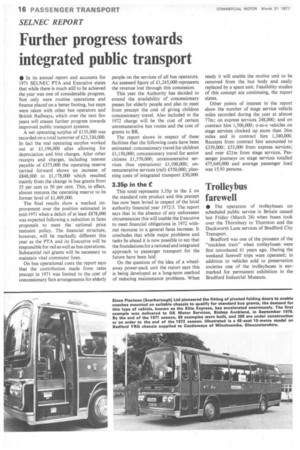SELNEC REPORT
Page 18

If you've noticed an error in this article please click here to report it so we can fix it.
Further progress towards integrated public transport
• In its annual report and accounts for 1971 SELNEC PTA and Executive states that while there is much still to be achieved the year was one of considerable progress. Not only were routine operations and finance placed on a better footing, but steps were taken with other bus operators and British Railways, which over the next few years will ensure further progress towards improved public transport systems.
A net operating surplus of £135,000 was recorded on a total turnover of £23,330,000. In fact the real operating surplus worked out at £1,196,000 after allowing for depreciation and hire charges. After other receipts and charges, including interest payable of £375,000 the operating reserve carried forward shows an increase of £848,000 to £1,178,000 which resulted mainly from the change in bus grants from 25 per cent to 50 per cent. This, in effect, almost restores the operating reserve to its former level of £1,409,000.
The final results show a marked improvement over the position estimated in mid-I971 when a deficit of at least £878,000 was expected following a reduction in fares proposals to meet the national price restraint policy. The financial structure, however, will be markedly different this year as the PTA and its Executive will be responsible for rail as well as bus operations. Substantial rail grants will be necessary to maintain vital commuter lines.
On bus operational costs the report says that the contribution made from rates precept in 1971 was limited to the cost of concessionary fare arrangements for elderly people on the services of all bus operators. An assessed figure of £1,245,000 represents the revenue lost through this concession.
This year the Authority has decided to extend the availability of concessionary passes for elderly people and also to meet from precept the cost of giving children concessionary travel. Also included in the 1972 charge will be the cost of certain unremunerative bus routes and the cost of grants to BR.
The report shows in respect of these facilities that the following costs have been estimated: concessionary travel for children £1,150,000; concessionary travel for senior citizens £1,570,000; unremunerative services (bus operations) £1,100,000; unremunerative services (rail) £550,000; planning costs of integrated transport £50,000.
3.35p in the £
This total represents 3.35p in the £ on the standard rate product and this precept has now been levied in respect of the local authority financial year 1972/3. The report says that in the absence of any unforeseen circumstances this will enable the Executive to meet financial obligations in 1972 without recourse to a general fares increase. It concludes that while major problems and tasks lie ahead it is now possible to say that the foundations for a rational and integrated approach to passenger transport for the future have been laid.
On the question of the idea of a wheelaway power-pack unit the report says this is being developed as a long-term method of reducing maintenance problems. When ready it will enable the motive unit to be removed from the bus body and easily replaced by a spare unit. Feasibility studies of this concept are continuing, the report states.
Other points of interest in the report show the number of stage service vehicle miles recorded during the year at almost 77m; on express services 248,000; and on contract hire 1,506,000; o-m-o vehicles on stage services clocked up more than 26m miles and in contract hire 1,340,000. Receipts from contract hire amounted to £339,000; £53,000 from express services; and over £21m from stage services. Passenger journeys on stage services totalled 475,649,000 and average passenger load was 15.93 persons.
Trolleybus farewell
• The operation of trolleybuses on scheduled public service in Britain ceased last Friday (March 24) when buses took over the Thornbury to Thornton and the Duckworth Lane services of Bradford City Transport.
Bradford was one of the pioneers of the "trackless tram" when trolleybuses were first introduced 61 years ago. During the weekend farewell trips were operated; in addition to vehicles sold to preservation societies one of the trolleybuses is earmarked for permanent exhibition in the Bradford Industrial Museum.




















































































